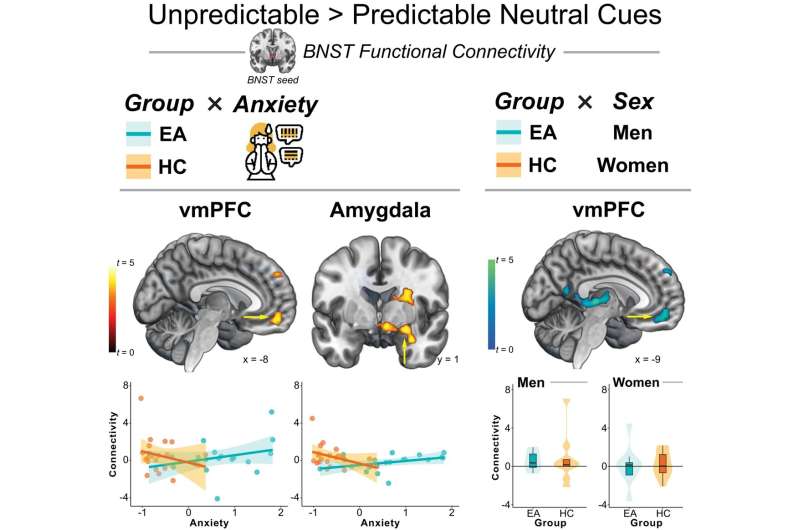This article has been reviewed according to Science X's editorial process and policies. Editors have highlighted the following attributes while ensuring the content's credibility:
fact-checked
trusted source
proofread
Brain shows changes in regions associated with anxiety after quitting alcohol, finds study

Certain regions of the brain show changes during the early stages after quitting drinking that may contribute to increased anxiety and relapse rates in people attempting recovery from alcohol use disorder, according to a study published in Alcohol: Clinical and Experimental Research.
The study further found that an individual's sex and severity of their anxiety play a significant role in the brain's response during early abstinence from alcohol use, with the brains of men and women responding differently. These findings highlight the need for a greater understanding of the neural mechanisms affected by alcohol use and abstinence to better support people trying to quit drinking.
Nearly half of people with alcohol use disorder who try to quit drinking typically relapse in the first year, which is thought to be associated with increased anxiety often experienced during the early stages of abstinence.
The study sought to examine changes in activation in different brain regions as well as functional connectivity in a network of brain regions associated with anxiety responses called the bed nucleus of the stria terminalis (BNST).
Forty people aged 21 to 40 years old participated in the study, half of whom were people with alcohol use disorder who had stopped drinking for one to six months prior to the study (the early abstinent group).
The other 20 participants made up the healthy control group. Researchers acquired functional MRI data from participants while they completed an 'unpredictable threat' task, in which they were shown images of neutral and negative expressions predictably and unpredictably cued by other images.
The results showed that activation and functional connectivity of the BNST network are altered during early abstinence and that anxiety severity and sex play a role in these alterations. During unpredictable threat cues, men in the healthy control group with higher anxiety showed more activation in the posterior cingulate than men in early abstinence.
For unpredictable threat images, anxiety was negatively associated in the healthy group and positively associated in the early abstinent group with activation in the BNST; activation in the insula and dorsal anterior cingulate cortex was greater in early abstinent men with higher anxiety than in men in the healthy control group.
Consistently elevated activation in these two brain regions across different stages of alcohol use disorder may indicate both brain changes due to heavy alcohol use and a biological risk factor for alcohol use disorder. Sex differences in brain activation were specific to men; previous studies have revealed sex differences in how alcohol use disorder presents and progresses in men and women.
The study also found that people in early abstinence showed altered BNST-functional connectivity during unpredictable threat cues, which was dependent on anxiety and sex.
Functional connectivity in the BNST-ventromedial prefrontal cortex was weaker in women in early abstinence during unpredictable threat cues and stronger in men during unpredictable neutral cues. People in the healthy group who had higher anxiety scores showed weaker connectivity in these regions during unpredictable cues than people in the early abstinent group.
Women in the early abstinence group showed weaker BNST-network functional connectivity, which may help explain the greater stress-induced relapse in women. The authors suggest future studies investigating the effect of hormones on this connectivity.
More information: Nicole L. Zabik et al, Bed nucleus of the stria terminalis network responses to unpredictable threat in early alcohol abstinence, Alcohol, Clinical and Experimental Research (2024). DOI: 10.1111/acer.15407




















